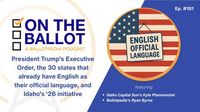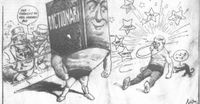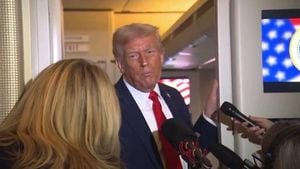In a significant political move, former President Donald Trump issued an executive order in March 2025 declaring English the official language of the United States. This decision coincided with Idaho lawmakers approving a constitutional amendment aimed at designating English as the official language at the state level, paving the way for a ballot measure in 2026. This push for English-only laws is not a new phenomenon; it has deep historical roots, shaped by evolving politics, cultural identity debates, and legal challenges that stretch back decades.
According to Kyle Pfannenstiel, a reporter for The Idaho Capital Sun, the recent developments in Idaho reflect a growing trend across the nation. Supporters of the constitutional amendment believe that designating English as the official language will promote unity and streamline government operations. However, opponents express concerns that such measures could marginalize non-English speakers and undermine the multicultural fabric of the state and the nation.
Interestingly, English is already the official language in 30 states, showcasing a long-standing movement toward the formal recognition of English in governmental affairs. Ryan Byrne, Ballot Measures Team Lead at Ballotpedia, elaborates on the history of English-as-official-language laws, noting that they gained significant momentum in the 1980s. Many of these laws have been more symbolic than substantive, often facing legal challenges that question their implications.
Idaho’s 2026 ballot measure aims to solidify the state’s stance on this issue, but its path forward could be contentious. Proponents argue that an official language is necessary for effective communication in government, while critics warn that it risks alienating immigrants and non-native speakers who contribute to the state’s diversity.
In the broader context, Trump’s executive order could inspire similar initiatives in other states, reigniting debates that have simmered for years. The implications of such measures touch on fundamental questions about national identity and inclusivity in a rapidly changing society.
As political discussions about language continue, another event is set to unfold in May 2025: the 100th anniversary of the Scripps Spelling Bee. This prestigious competition will bring together students from across the United States, all eager to tackle the complexities of English spelling—a system that many agree is notoriously inconsistent. Participants will arrive equipped with word lists, flashcards, and an arsenal of strategies to conquer words that have baffled even the most skilled spellers.
The spelling bee, a staple in English-speaking countries, highlights the absurdities of English orthography. For instance, words like "choir" and "liar" rhyme, while "daughter" and "laughter" do not. The question remains: why do we cling to such an erratic system? Over the years, numerous attempts have been made to reform English spelling, yet none have succeeded in achieving widespread acceptance.
Benjamin Franklin was among the early advocates for spelling reform. In 1768, he proposed a radical idea to remove six letters from the alphabet—C, J, Q, W, X, and Y—and respell common words to reflect their phonetic sounds. For example, he suggested writing "friend" as "frend" and "could" as "kuld." Despite his efforts, Franklin's proposals were met with ridicule, and he never publicly pursued the idea again.
Noah Webster, the renowned lexicographer, also attempted to simplify English spelling. In 1789, he advocated for changes such as spelling "grief" as "greef" and "laugh" as "laf." His ideas were often mocked, and critics exaggerated his proposals to paint him as a comical figure. Nevertheless, Webster's influence on American English is undeniable, and his dictionary remains a cornerstone of English language reference.
Other reformers emerged throughout the 19th century, including James Ruggles, who in 1829 proposed a "Universal Language" that aimed to regularize spelling and grammar. His suggestions included changing "could" to "cood" and the past tense of "know" to "noed." In 1842, Auguste Thibaudin took a more radical approach, suggesting that all vowels be replaced with numbers, resulting in a bizarre translation of the Lord's Prayer.
Major Bartłomiej Beniowski, a military officer in London, launched a campaign in 1844 against what he termed English's "glaring absurdities." He developed a 35-letter "Anti-Absurd Alphabet" and called for all books to be printed in this new format. His efforts reflected a growing discontent with the complexities of English spelling.
The peak of the Simplified Spelling Movement came in 1906 when the Simplified Spelling Board was established in New York City. This board, which included prominent figures like Andrew Carnegie and Mark Twain, circulated a list of 300 recommended spellings for adoption in schools and publications. President Theodore Roosevelt even issued an executive order mandating simplified spellings in federal documents. However, the backlash was swift, and Congress overturned Roosevelt's order just months later, marking the decline of the movement.
Despite the historical challenges faced by spelling reformers, the spirit of simplification persists today. The rise of digital communication has led to the widespread use of abbreviations and simplified spellings, reflecting a cultural shift toward efficiency. Words like "thru" and "tho" have become commonplace, indicating that the dream of simplified spelling may not be entirely over.
As the Scripps Spelling Bee approaches and discussions about English as an official language continue, the complexities of language and identity remain at the forefront of American consciousness. The ongoing dialogue about language reflects broader societal questions about inclusion, diversity, and the evolving nature of communication in a globalized world.





